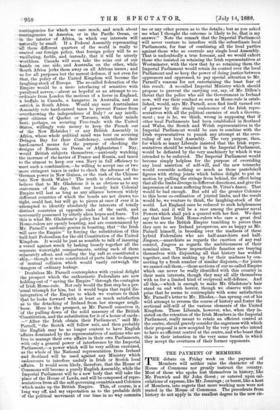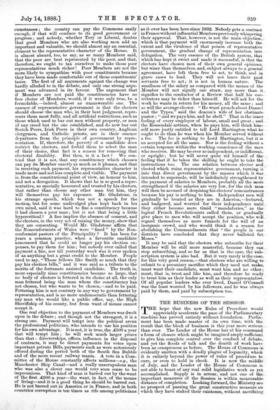THE PAYMENT OF MEMBERS.
THE debate on Friday week on the payment of Members will neither raise the character of the House of Commons nor greatly instruct the country. Most of those who spoke lost themselves in history, like Mr. Fenwiek and Sir John Gorst ; or entered upon cal- culations of expense, like Mr. Jennings ; or burst, like a host of Members, into regrets that more working men were not seated in the House of Commons. The precedents from history do not apply in the smallest degree to the new cir- cumstances ; the country can pay the Commons easily enough, if that will conduce to its good government or progress ; and. nobody, whether Tory or Liberal, doubts that good Members who are also working men add an important and valuable, we should almost say an essential, element to the representative character of the House. It is almost absurd, too, to say, as so many Members said, that the poor are best represented by the poor, and. that, therefore, we ought to tax ourselves to make those poor representatives much richer ! Poor Members are not the more likely to sympathise with poor constituents because they have been made comfortable out of those constituents' taxes. The first of all arguments against the change was hardly alluded to in the debate, and only one strong argu- ment was advanced in its favour. The argument that if Members are not paid the constituencies have no free choice of Members, would, if it were only true, be a formidable,—indeed, almost an unanswerable one. The essence of representative government is that the electors should choose the man who, in their best judgment, repre- sents them most fully, and all artificial restrictions, such as those which used to bar out men without property, or men of any creed but the one established, and do now bar out Scotch Peers, Irish Peers in their own country, Anglican clergymen, and Catholic priests, are in their essence departures from the principle of government by repre- sentation. If, therefore, the poverty of a candidate does restrict the electors, and forbid them to select the man of - their choice, that fact is a reason for removing that electoral disability. But then, is it a fact ? We con- tend that it is not, that any constituency which chooses can pay its Member exactly as much as it pleases, and that in receiving such payment, his representative character is made more and. not less complete and. visible. The payment is, from the constitutional point of view, an honour to him, and not a derogation. It shows that he is so good a repre- sentative, so specially honoured and trusted by his electors, that rather than choose any other man but him, they will themselves pay his expenses. Mr. Gladstone, in his strange speech, which was not a speech for the motion, but for some undivulged plan kept back in his own mind, said it was hard to fine a constituency because it had chosen a poor man; but is not that being a little hypercritical ? A fine implies the absence of consent, and the electors, in the very act of raising the money, show that they are consenting. Would Mr. Gladstone affirm that the Nonconformists of Wales were " fined " by the Non- conformist pastors of the Principality ? It has been for years a common practice, when a favourite candidate announced that he could no longer pay his election ex- penses, to pay them for him ; but nobody ever called that payment a fine, nor till yesterday week was it ever spoken of as anything but a great credit to the Member. People used to say, "Those fellows like Smith so much that they pay his election bills," and it was said as a tribute to the merits of the fortunate assisted candidate. The truth is, more especially since constituencies became so large, that no body of electors is fettered in its choice at all, the only man fettered being the man whom the constituency has not chosen, but who wants to be chosen,—and to be paid. Fettering him is not contrary in any way to government by representation, and is no more undemocratic than fettering any man who would like a public office, say, the High Sheriffship of his county, but from want of means cannot accept it.
One real objection to the payment of Members was dwelt upon in the debate ; and though not the strongest, it is a strong one. Payment will tetapt into the political arena the professional politician, who intends to use his position for his own advantage. It is not, it is true, the £500 a year that will tempt him ; he will seek much larger prizes than that : directorships, offices, influence in the disposal of contracts, it may be direct payments for votes upon important private Bills, payments such as were notoriously offered during the period both of the South Sea Bubble and of the more recent railway mania. A vote in a Com- mittee of the House constantly affects millions—e.g., the Manchester Ship Canal—and a really unscrupulous man who was also a clever one would very soon cease to be impecunious. That kind of man is barred out by the want of the first £500 a year—the want, in fact, of the means of living—and it is a good thing he should be barred out. He is not barred out in America or in France, and in both countries corruption is ten times as rife among politicians as it ever has been here since 1882. Nobody gets a contract in France without influential Members previously whispering their approval. That, however, is not the main objection,.. which is that payment will enormously increase both the extent and the virulence of that poison of representative government, the gradual change of representation into . delegation. The very essence of the British system, that which has kept it sweet and made it successful, is that the electors have chosen men of their own general opinions, but wiser than themselves, and, subject always to a general agreement, have left them free to act, to think, and in, grave cases to lead. They will not leave their paid servants free to act ; it is not in human nature. The smallness of the salary as compared with the means of the Member will not signify one straw, any more than it signifies to the conductor of a Review that half his con. • tributors may be richer than himself. He will ask for the work he wants in return for his money, all the same ; and, so will the average elector. "He want preach about Dannel and the Types," said the deacon's wife of her obstinate pastor ; "and we pays him, and he shell." That is the inner feeling of every employer of labour, small and great ; and . the Rossendale artisan, when he pays him, will think him- • self more justly entitled to tell Lord Hartington what he • ought to do than he was when his Member served without a fee. The fee is nothing to Lord Hartington, but it is an accepted fee all the same. Nor is the feeling without a certain response within the working conscience of the man who receives. He may be ever so independent, or indifferent, or upright ; but he will never quite rid himself of the- feeling that if he takes the shilling he ought to take the instructions too. The one relation between elector and.. , elected, which ruins representative government, turning it into that direct government by the masses which it was intended to supersede, will be indefinitely strengthened by the payment of salaries to Members, probably all the more strengthened if the salaries are very low, for the rich man- will then be accused of despising his electors' remonstrances, because his pay is nothing to him. Independent men will gradually be treated as they are in America,—lectured, and. badgered, and worried for their independence until they either become mere timid. " manclatories," as the logical French Revolutionists called them, or gradually give place to men who will accept the position, who will. regard themselves as mere funnels for the will of an , inorganic crowd, and who would. think it a reason for abolishing the Commandments that "the people in ours districts have concluded that they never balloted. for Moses."
It may be said that the electors who subscribe for their Member will be still more masterful, because they can stop subscribing, and so far as that is the ease, the sub-. scription system is also bad. But it very rarely is the case, for this very good reason,—that electors who are willing to submit to a pecuniary sacrifice which they need not make, must want their candidate, must want him and no other; must, that is, trust and like him, and. therefore be ready, to treat him as their leader as well as their representative. Of all popular leaders who ever lived, Daniel O'Connell was the least worried by his followers, and he was always paid by them, and paid by subscription too.



































 Previous page
Previous page